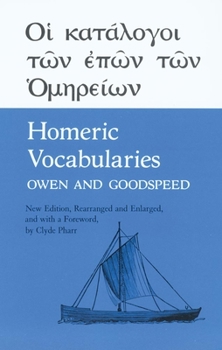Homeric Vocabularies
Select Format
Select Condition 
Book Overview
An essential step in learning and using any language is the acquisition of a working vocabulary. Many methods have been devised to help with this acquisition, all of them stressing the fundamental importance of mastering the words most frequently used. The Owen and Goodspeed word-lists--in which Homeric terms are arranged according to frequency of usage, divided into categories according to parts of speech, and presented in an easy-to-use format--are...
Format:Paperback
Language:English
ISBN:0806108282
ISBN13:9780806108285
Release Date:April 1969
Publisher:University of Oklahoma Press
Length:96 Pages
Weight:0.28 lbs.
Dimensions:0.4" x 4.8" x 7.6"
Related Subjects
Ancient & Classical Literature Contemporary Foreign Language Foreign Language Learning Foreign Language Study Foreign Language Study & Reference Foreign Languages Greek History Humanities Literary Criticism & Collections Literature Literature & Fiction Medieval Movements & Periods PoetryCustomer Reviews
5 ratings
Indispensible Study Aid
Published by Thriftbooks.com User , 19 years ago
I will disagree with the reviewers that fault Owen & Goodspeed for the lack of principle parts and alternate definitions; for me, the strength of this little volume was the ability to carry it tucked in a pocket and quickly drill vocabulary when I had a few minutes. Anyone reading Homer should have a good lexicon and use that for examining meanings and forms; if you memorize the contents of Owen & Goodspeed, you'll be able to quickly identify words and, if necessary, look them up for other meanings or unusual forms.
Simple but effective
Published by Thriftbooks.com User , 22 years ago
This wordlist is of inestimable value to all those few yet thrice-blessed who still learn to read Homer in Greek. By the time you finish it, you will have at least a nodding acquaintance with every word that appears ten times or more in the Iliad and Odyssey. That may indeed leave a trireme of unknown words, but trust me, knowing the most frequent ones makes it much easier to get the gist of a passage before running to the lexicon. If you are learning Homer from Pharr--as nearly everyone does--this is a good reference to consult to see which words in his chapter vocabularies are worth committing to your active memory. (I wish that Pharr had marked the words of infrequent occurrence. Wright should have done this in his "revision" but he didn't really revise Pharr much at all.)There is only one shortcoming, though I do consider it a serious one: the list of verbs does not include principal parts, and the noun list does not give genders or stems. You could easily write in the article and genitive forms for the nouns, but good luck trying to fit the five remaining principal parts of a verb on the same line as its entry. So no matter how you solve this problem, you will still need to look up nearly every word. That's an onerous task to inflict on a beginner. With a class of students, though, I suppose the teacher could divide up the drudge-work.
A must-do for reading Homer
Published by Thriftbooks.com User , 23 years ago
If you build your vocabulary, the lexicons/dictionaries will become your friends instead of your taskmasters as you read Homer. Use this handy, helpful little gem (making your own flashcards) while you go through Pharr's primer.
Buy It Now!
Published by Thriftbooks.com User , 24 years ago
You will never again find as easy, portable, inexpensive or invaluable a tool for learning the vocabulary of a single author. And since Homer was used as the foundation of Greek education, understanding Homer wil enlighten and enlarge your understanding of other authors immeausurably. What are you waiting for?
Homeric Vocabularies is an excellent resource!
Published by Thriftbooks.com User , 24 years ago
I found "Homeric Vocabularies" to be very useful while I was learning to read Homer in Greek. Using this book as a reference, I have been able to learn a fair number of vocabulary words used in the "Iliad" and the "Odyssey." The most helpful aspect of this book is that the vocabulary words are ordered in groups according to its frequency of occurence in the Epic Poems. By learning the vocabulary words from this book, I have been able to read through more of the Greek text without pausing to look up a word. Overall, the book is practical, easy to use, and an excellent reference for anyone learning to read Homeric Greek. (Finally, it's a great companion to "Homeric Greek" by Clyde Pharr et al.)






